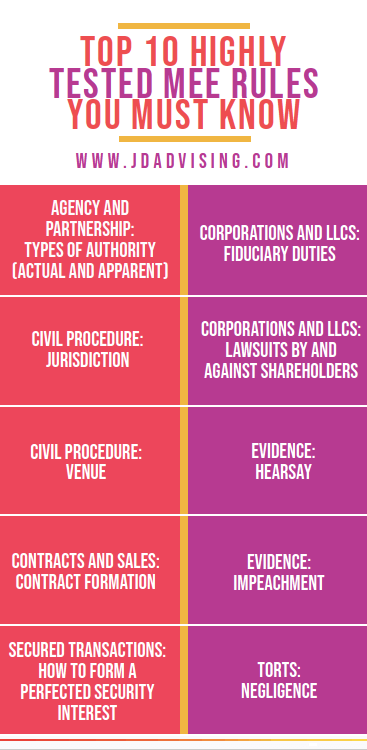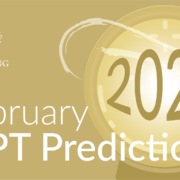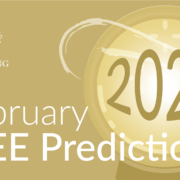Top 10 Highly Tested MEE Rules You MUST Know
Top 10 Highly Tested MEE Rules You MUST Know
Studying for the Multistate Essay Exam (MEE) is all about studying smart. Not all MEE subjects (and the topics within these subjects) are created equally. Thus, when deciding what the most important rules to learn are, you must consider what are the highly tested MEE topics. In this post, we have put together a list of the top 10 highly tested MEE rules that you MUST know for the exam! And for more details on these issues and advice on how to pass the MEE, be sure to check out our MEE One-Sheets and this post on highly tested MEE topics!
Top 10 Highly Tested MEE Rules You MUST Know (listed in alphabetical order by subject):

-
Agency and Partnership: Types of Authority (Actual and Apparent)
Whether an agent had authority is a very highly tested MEE topic in agency and partnership essays. A principal will be bound on a contract entered into by an agent as long as the agent had authority to do so. There are two main types of authority: actual (which has two sub-categories) and apparent. Actual authority can be express, where the agent is expressly given authority to act for the principal, or implied. Implied authority exists when the agent is led to believe it has authority through the principal’s conduct.
For apparent authority to be present, we need three things. First, the person dealing with the agent must do so with a reasonable belief in the agent’s authority. Second, that belief must be generated by some act or neglect on the part of the principal. Third, the person dealing with the agent must not be negligent. Even if the agent did not have authority, the principal can still become liable if it ratifies the acts. This means that the principal must expressly or impliedly affirm or accept the benefits of the acts as long as he knew the material facts and had capacity.
MEE Tip: Make sure to memorize the two types of actual and apparent authority as well as what is necessary to create apparent authority. These concepts are heavily tested in MEE essays.
-
Civil Procedure: Jurisdiction
Civil procedure is the most highly tested MEE subject. Thus, it makes sense to devote a significant amount of time to these rules. When civil procedure is tested, the Examiners frequently present jurisdiction issues. Personal jurisdiction can be general (consent, presence, or domicile) or specific. Specific personal jurisdiction requires a look to the long-arm statute of the state the court sits in. There must also be a second inquiry into the constitutionality of the exercise of specific personal jurisdiction. To be constitutional under the due process clause, a non-resident defendant must have established minimum contacts with the state. The exercise of personal jurisdiction must not offend traditional notions of fair play and substantial justice. Look for purposeful availment of the benefits and protections of the state, and then examine the quality of the contacts.
MEE Tip: Most importantly, memorize these key terms – “minimum contacts”, “purposeful availment” and “traditional notions of fair play and substantial justice.” By memorizing (and underlining or bolding!) key terms, the grader will instantly see that you know what you are talking about!
There are three categories of subject matter jurisdiction that turn up in civil procedure MEE questions.
- Federal question jurisdiction involves a federal court’s ability to hear cases that address a federal question. The question must appear in the plaintiff’s well-plead complaint.
- Second, federal courts can hear cases based on diversity jurisdiction, which has two requirements: 1) there must be complete diversity of citizenship between the defendants, and 2) the amount in controversy must be over $75,000.
- Finally, federal courts can hear cases based on supplemental jurisdiction. This is an issue when there is a jurisdictional basis for one claim but not the other. Remember that plaintiffs cannot add claims against non-diverse parties if the sole basis for subject matter jurisdiction is diversity.
-
Civil Procedure: Venue
Besides jurisdiction rules, it is also important to understand venue as it is also a highly tested MEE topic in civil procedure. Venue is proper in a district where any defendant resides if all defendants reside in the same state, or in a district where a substantial part of the events/omissions/property giving rise to the claim occurred/is located. The concept of a transfer to a more appropriate forum is a highly tested MEE sub-topic within venue. A federal court has authority to transfer a case to another federal district for the convenience of the parties and witnesses in the interests of justice. However, there still needs to be both subject matter and personal jurisdiction. MEE Tip: Remember for transfer to a more appropriate forum, the court will apply the of the transferor forum. So if the plaintiff sued in State A and the defendant asked for the case to be transferred to State B, if it was in the interests of justice, the court would transfer the case. However, the law of State A would apply. A motion to transfer to a more appropriate forum should be denied if the case could not have been filed there to begin with.
-
Contracts and Sales: Contract Formation
While contract formation is the most basic contracts and sales topic, it is also a highly tested MEE rule. Remember that to have a valid contract, you need an offer, acceptance, and consideration. An offer is a communicated statement of willingness to enter into a bargain with another so that the other understands his assent to the bargain is invited and will conclude it. The terms of an offer need to be reasonably certain. Compare this with a counteroffer under common law, when the terms of the initial offer are changed.
An acceptance is a manifestation of assent to the terms of an offer made in a manner invited by the offer. It is effective upon dispatch. Compare this with a rejection, which is a manifestation of intent not to accept the offer and terminates the offeree’s power to accept an offer. It is effective when received by the offeror. If a rejection is sent and then an acceptance is sent, whichever gets to the recipient first is effective.
Consideration is a bargained-for exchange. A promise to make a gift does not constitute consideration. Neither does promising to perform a legal duty already owed to a promisor, with limited exceptions. A substitute for consideration is promissory estoppel. If there is a promise, reliance that is foreseeable and justifiable, and enforcement is necessary to avoid injustice, the promise will be enforced.
-
Corporations and LLCs: Fiduciary Duties
The fiduciary duties owed by directors or LLC members are highly tested MEE topics. One major duty is the duty of care. There is a presumption that in making a business decision, the directors acted on an informed basis, in good faith and in the honest belief that the action taken was in the best interest of the company. MEE Tip: Memorize this presumption! It appears in many MEE essays! Directors must be informed to an extent that they reasonably believe is appropriate. They are allowed to rely upon information, opinions, reports, or statements of corporate officers, legal counsel, public accountants, and others when they are making decisions. If a shareholder wants to challenge an action on the basis of a violation of the duty of care, that shareholder has the burden of proof to demonstrate that the duty of care has been breached. MEE Tip: While it is generally difficult to prove that the duty of care is breached, on the MEE it has been tested where directors shareholders do things such as talk about a major decision for only ten minutes. This could be a breach of the duty of care!
The second major duty is the duty of loyalty. A director must act in good faith and with a reasonable belief that what he does is in the corporation’s best interest. The business judgment rule does not apply here. This issue typically comes up in three ways:
- First, when a director is on both sides of a transaction. (An example would be the director voting to approve a contract on behalf of ABC corporation to enter into a contract with XYZ inc–and he is a shareholder of both corporations.)
- Second, when a director may not compete with its corporation. (An example is that a director who sits on the board of a coffee shop cannot open a competing coffee shop next door.)
- Third, a corporate officer may not usurp a corporate opportunity. (An example is that a director who sits on the board of a wine company cannot procure a great deal on wine for himself while out on a business trip to scout out good deals on wine for the corporation without offering it to the corporation first.)
There are three defenses a director can assert if accused with a duty of loyalty breach:
- First, the transaction can be approved by disinterested directors if all relevant information is disclosed.
- Second, the transaction can be approved by disinterested shareholders.
- Lastly, the transaction can be judged to be fair at the time it was entered into.
-
Corporations and LLCs: Lawsuits by and Against Shareholders
Questions in this subject will often ask if a shareholder can maintain a suit against the corporation or whether a suit can be maintained against a shareholder. This is certainly a highly tested MEE set of rules. A shareholder can file an action to establish that the acts of the directors are illegal, fraudulent, or willfully unfair and oppressive to the corporation or to the shareholder. Direct suits are when the director’s action amounts to a breach of duty owed to the individual shareholder personally. A derivative suit is appropriate when the injury is caused to the corporation and a shareholder is trying to protect the corporation. In order to file a derivative lawsuit, a shareholder must have standing, must adequately represent the interests of the corporation, and must make written demand on the corporation. MEE Tip: remember “SAD” — standing, adequacy, and demand.
In some situations, courts will disregard the separate corporate entity and hold shareholders (or LLC members) personally liable for the corporation’s debts. This is called piercing the corporate veil. The plaintiff must show that the shareholder(s) or LLC member(s) abused the privilege of incorporating. Evidence of this includes undercapitalization of the business, failing to follow formalities, commingling of assets, confusion of business affairs, or deception of creditors. MEE Tip: this is frequently tested in the context of LLCs so don’t forget that piercing the corporate veil can be used to hold members of an LLC liable.
-
Evidence: Hearsay
Hearsay is far and away the most highly tested MEE topic in evidence. When you see a question involving hearsay, your first step should always be to define it. Hearsay is a statement, other than one made by the declarant while testifying at trial or a hearing, offered in evidence to prove the truth of the matter asserted. If a statement is hearsay, it is not admissible unless it falls within one of the exceptions or exclusions.
The following are some of the most commonly used exceptions and exclusions in Evidence:
- Excited Utterance: a statement relating to a startling event or condition made while the declarant was under the stress or excitement that it caused
- Present Sense Impression: a statement describing or explaining an event or condition made while or immediately after the declarant perceived it
- Statement for Purpose of Medical Treatment or Diagnosis: must be made for and reasonably pertinent to medical diagnosis or treatment and describe medical history, past or present symptoms or sensations, their inception, or their general cause
- Business Records: must be a record of acts, events, conditions, opinions, or diagnoses made at or near the time of the event recorded by a person with knowledge of the event. Further, the making of the record must occur in the course of a regularly conducted business activity, and it must be the regular practice of the business to make the record.
- Past Recollection Recorded: a record that is on a matter that the witness once knew about but now cannot recall well enough to testify fully and accurately, and was made while the matter was fresh in the witness’s memory. The witness can read the record, but it should not be offered as an exhibit.
- State of Mind: if offered to show state of mind and not truth, it is not hearsay
- Statement by Party-opponent: A statement made by an opposing party offered against that party is not hearsay.
-
Evidence: Impeachment
Any party can impeach a witness, and there are seven ways of doing so: prior inconsistent statements, bias and interest, conviction of a crime, bad acts, reputation or opinion for untruthfulness, sensory deficiencies, and contradiction. This is another highly tested MEE evidence topic, so make sure you learn the intricacies involved in each. Extrinsic evidence is not always allowed to prove these things and there are many restrictions involved, particularly regarding what types of convictions can be used. MEE Tip: convictions are frequently tested with impeachment on the MEE so make sure you know the rules regarding when convictions can be admitted to impeach.
-
Secured Transactions: How to Form a Perfected Security Interest
In order to have a perfected security interest, the interest must first have attached. This highly tested MEE rule comes up in almost every instance of secured transactions exam. For a valid security interest to arise, three things must occur. First, value must be given by the secured party to the debtor. Second, the debtor must have rights in the collateral. Finally, there must be a finding security agreement, which requires authentication, intent, and a description of the collateral.
Perfection doesn’t come up quite as frequently as attachment, but it is a still highly tested MEE topic in secured transactions. Remember that perfection can occur by the filing of a financing statement. However, a security interest in each type of good can also be perfected in different ways. For example, a PMSI in consumer goods is automatically perfected. Or the interest might be perfected upon possession of the good, or control of the good.
MEE Tip: make sure to have the key vocabulary memorized — you should use words like perfection, attachment, collateral, and PMSI when appropriate in Secured Transactions essays!
-
Torts: Negligence
When we see Torts on the Multistate Essay Exam, negligence is by far the most highly tested MEE topic in the subject. Thus, it would be very beneficial for you to focus significantly on this issue. In general, remember that the basic elements are: duty, breach, causation (both actual and proximate), and damages. Duty and breach are probably the elements most ripe for testing.
When thinking about these elements, consider the following sub-issues:
- Children and their duty: Generally, a child owes the duty of care of a hypothetical child of similar age, intelligence, and experience, acting under similar circumstances. One exception is when the child is engaging in an adult activity. Additionally, some states follow the “tender years doctrine,” where children under the age of 7 cannot be found negligent.
- Premises liability: This topic has turned up in three of the most recent years that we’ve seen Torts on the Multistate Essay Exam. Remember that the standard of care owed depends on the legal status of the plaintiff. Undiscovered trespassers are not owed any duty of care. By contrast, if the trespasser is “discovered,” then the landowner must warn or make safe any unreasonably dangerous concealed artificial conditions that the landowner knows of. For licensees, most MEE answers state that landowners owe the duty to reveal hidden dangers of which the landowner knows or has reason to know and which the entrant is unlikely to discover. Finally, regarding invitees, the landowner must warn or make safe all dangers that the landowner knows or should know of. For this category, there is a duty to inspect.
- Negligence per se: If a question involving Torts on the Multistate Essay Exam presents a statute that establishes a duty of care, you should consider negligence per se. To sue under this theory, the plaintiff must show that (1) the defendant violated the statute without excuse; (2) the plaintiff was in the class of people the statute was trying to protect; and (3) the plaintiff received the injury that the statute was trying to prevent. If these three things can be demonstrated, then the plaintiff has proven the duty and breach elements of negligence.
For more details on these issues and advice on how to pass the MEE, be sure to check out our MEE one-sheets and this post on highly tested MEE topics!
Seeking MEE Expertise?
🌟 Freebies & Discounts
- Free Bar Exam Resource Center: Explore for leading guides, articles, and webinars.
- Expert-Crafted Bar Exam Guides: Unveil insights on high-frequency MEE topics and strategies for success.
- Free Webinars: Engage with top bar exam experts.
🔥 Top-Rated MEE Resources
- MEE One-Sheets: Boost your confidence with our most popular bar exam product!
- Bar Exam Outlines: Our comprehensive and condensed bar exam outlines present key information in an organized, easy-to-digest layout.
- NEW MEE Mastery Class: Unearth focused, engaging reviews of essential MEE topics.
- Bar Exam Crash Course and Mini Outlines: Opt for a swift, comprehensive refresher.
- MEE Private Tutoring and feedback: Elevate your approach with tailored success strategies.
- MEE Course: Preview our acclaimed five-star program for unmatched instruction, outlines, and questions.
🔥 NEW! Dive deep into our Repeat Taker Bar Exam Course and discover our unrivaled Platinum Guarantee Pass Program.






Leave a Reply
Want to join the discussion?Feel free to contribute!